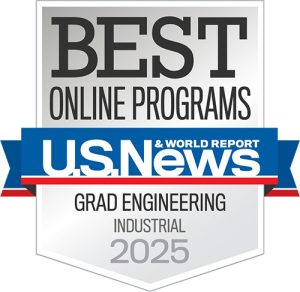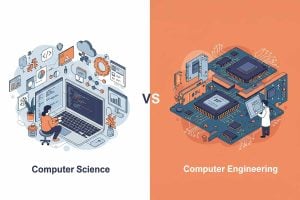
Johns Hopkins Industrial and Operations Engineering Program Overview
Take on the unexpected bottlenecks in multifaceted systems and discover solutions to complex operational problems in any industry with a Master of Science in Industrial and Operations Engineering from the Johns Hopkins Engineering for Professionals online or hybrid graduate program. Learn to create technical solutions to help businesses operate efficiently through automation and create infrastructures that improve production and the interfaces between people and machines. And you’ll also be prepared to improve systematic processes through rigorous statistical and mathematical analysis and streamline services to ensure product quality—all while you work.

The benefit of earning a master’s in industrial and operations engineering (online or hybrid) is the opportunity to immediately implement new techniques and algorithms in your job. You can also be confident that what you are learning is backed by the strength of the faculty of expert engineering practitioners and notable research scientists coming from Johns Hopkins Engineering, US industry, and the JHU Applied Physics Laboratory.
Designed with a unique blend of courses across the discipline, the master’s in industrial and operations engineering covers topics in statistics, data analytics, optimization, operations research, engineering economics, systems engineering, and mathematical modeling to provide you with comprehensive knowledge that can take your career in the upward direction that you’ve imagined. According to the Bureau of Labor Statistics, the number of jobs in industrial engineering is projected to grow 13.7 percent through 2030. Along with growth and the complement of an advanced degree is the opportunity for greater income.
With the option to choose from eight focus areas, at the program’s completion, you will:
- Be able to develop a systems description or design for complex systems and processes.
- Acquire the knowledge to articulate the requirements, drivers, functions, components, interdependencies, risks and quality factors for various systems and processes.
- Lead in the introduction of new industrial and operations engineering features and algorithms improve processes in government, industry, and otherwise.
- Direct the evaluation of the performance of the industrial and operations engineering components of systems and processes.
Master’s Degree Focus Areas
A focus area/concentration must be selected. Your focus area will not appear on your diploma but will provide a tailored education for students looking to specialize in a specific field.
- Financial Systems: Study methods that provide greater insight into analytics and modeling, financial planning and forecasting, and financial business intelligence guided by financial engineering principles.
- Energy and Environmental Systems: Study techniques to design environmental systems and manage risk for electric power, alternative energy technologies, wastewater treatment and more.
- Healthcare Engineering: Study the requirements, drivers, functions, components, interdependencies, risks, and quality factors for various healthcare systems and processes.
- Human Factors and Ergonomics: Students will be equipped with the knowledge of human capabilities and introduce human systems engineering concepts and design principles.
- Manufacturing and Facilities: Study the advanced technologies to design, develop, test, and optimize manufacturing processes and mechanical devices through courses covering robot control, advanced machine design, and more.
- Operations Research and Intelligent Systems: Study the integration of statistically based frameworks and combine that knowledge to make people and processes safer, more efficient, and more effective through courses like Neural Networks and Bayesian Statistics.
- Quality Engineering and Applied Statistics: Study modern methods that incorporate quality improvement initiatives into strategies and systems that enhance performance, efficiency, and outcomes of processes, products, or services.
- Transportation, Networks, and Supply Chains: Through courses such as Network Models and Analysis and Resilience of Complex Systems, study techniques to design efficiency in links, nodes, and lines for transportation supply chain infrastructures.
FOCUS AREA REQUIREMENTS
Programs
The Master's of Science in Industrial and Operations Engineering can be earned completely online, or you can take courses onsite at the Johns Hopkins Applied Physics Lab in Laurel, Maryland.
Industrial and Operations Engineering
Each course in the Industrial and Operations Engineering program is taught by skilled experts who use their concepts they teach in their own careers every day. Explore all online courses, find course requirements, prerequisites, and elected information. For exact dates, times, locations, fees, and instructors, please refer to the course schedule published each term.
Program Contacts
-
James Spall
Program Chair Applied and Computational Mathematics, Program Chair Industrial and Operations Engineering Email:james.spall@jhuapl.edu
Email:james.spall@jhuapl.edu
-
Email:aharwel3@jhu.edu
-
 Email:hayley.beach@jhuapl.edu
Email:hayley.beach@jhuapl.edu
Tuition and Fees
Did you know that 78 percent of our enrolled students’ tuition is covered by employer contribution programs? Find out more about the cost of tuition for prerequisite and program courses and the Dean’s Fellowship.
Why Hopkins?
When ambition meets opportunity, anything is possible. Earn your degree on your terms at Johns Hopkins Engineering for Professionals.

Expert Faculty - Study with faculty who are practicing scientists and notable professionals with corporations and government entities, including the Johns Hopkins Applied Physics Lab, NASA, Raytheon, and the U.S. Department of Defense. Exceptional one-on-one mentoring sets you on a course to be a confident, knowledgeable leader. Learn More

Educating Working Professionals Online for 18+ Years - Online courses at Johns Hopkins Engineering for Professionals puts you in control—giving you must-have options to learn at your pace and the flexibility you need to balance work, family, and life, while advancing your career. Learn More

Network and Connect - Your knowledge is stronger with a network. In the applied and computational mathematics program, you will make career-advancing connections with accomplished scientists and engineers who represent a variety of disciplines across many industries. Learn More
Academic Calendar
Find out when registration opens, classes start, transcript deadlines and more. Applications are accepted year-round, so you can apply any time.



